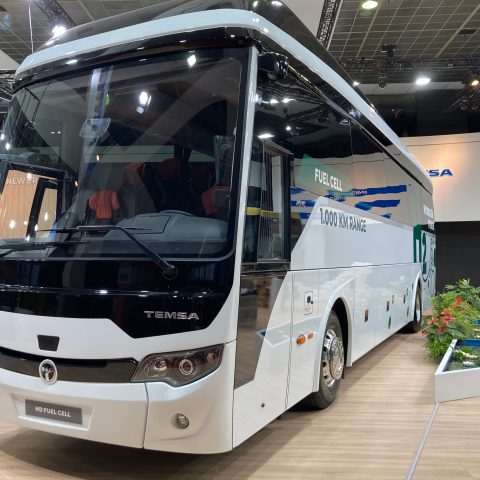Here it comes Temsa – CaetanoBus fuel cell coach
Temsa showcases at Busworld three models from its zero-emission product range at the Busworld Europe, starting with its intercity hydrogen bus, a collaborative project with CaetanoBus. The producer claims this vehicle is capable of covering a distance of 1,000 kilometers on a single refill. The vehicle is expected to enter mass production in 2025. Alongside […]

Temsa showcases at Busworld three models from its zero-emission product range at the Busworld Europe, starting with its intercity hydrogen bus, a collaborative project with CaetanoBus. The producer claims this vehicle is capable of covering a distance of 1,000 kilometers on a single refill.
The vehicle is expected to enter mass production in 2025.
Alongside the electric bus, Avenue Electron, Temsa also introduced the battery-electric intercity bus LD SB E.
In 2023 Temsa achieved a growth performance of 30 percent in North America, which is our leading priority market, and increased our market share in this region up to almost 20 percent. On Euro basis, we achieved growth figures of 171 percent in the EMEA region and 77 percent in Western Europe. Globally, we have a growth performance of 61 percent on Euro basis
Tolga Kaan Doğancıoğlu, ceo, temsa
Temsa with CaetanoBus for the fuel cell coach
The hydrogen bus project, which began development under the Joint Development Agreement signed last month, will combine the Toyota hydrogen fuel cell technology used in CaetanoBus for its city buses with Temsa engineers’ know-how in electric and long-distance buses.
The technology to be integrated into the bus on the Temsa HD platform is designed to provide the bus with an estimated range of around 1,000 kilometers on a single tank.
During the press conference held at the exhibition, Temsa CEO Tolga Kaan Doğancıoğlu stated: “Today, we demonstrate our commitment to sustainability with a product range that includes 10 different vehicles, consisting of 8 electric and 2 hydrogen-powered vehicles. Furthermore, we continuously enhance our business processes and models with a strong focus on sustainability, collaborating with global platforms like CDP, SBTi, Global Compact, and Ecovadis.”
Doğancıoğlu also said: “We are pleased to announce that we have received an EPD (Environmental Product Declaration) certificate for our Avenue Electron bus, which is on display at this exhibition. We are honored to be the sixth manufacturer in the world to receive such a certificate for a bus. When we consider 2021 as our starting point, we achieved a significant 19 percent reduction in water consumption per vehicle and a remarkable 29 percent reduction in both Scope 1 and Scope 2 emissions by the conclusion of 2022. At present, we procure all the electricity used at the TEMSA production facility from renewable energy sources.”
Doğancıoğlu also highlighted that Temsa allocates approximately 5 percent of its annual revenue to research and development (R&D) activities: “Our dedication to innovation empowers us greatly as we progress toward our sustainability objectives. Through this approach, we not only enhance the efficiency of our production processes but also expand the scope of sustainable business models throughout TEMSA. Currently, over 50 percent of all our R&D initiatives are directly associated with sustainability. However, our focus on sustainability doesn’t revolve solely around innovation and efficiency. In accordance with our comprehensive sustainability roadmap, which encompasses all aspects of ESG (Environmental, Social, and Governance), we initiate pioneering projects that prioritize social benefits. Today, TEMSA has evolved into a ‘social mobility company’ that generates 14 units of social benefit for every 1 unit of investment, thanks to exemplary projects in the realms of arts, sports, and literature.







